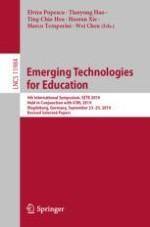2020 | OriginalPaper | Buchkapitel
Blended Learning Approach in English Language Teaching – Its Benefits, Challenges, and Perspectives
verfasst von : Blanka Klímová, Marcel Pikhart
Erschienen in: Emerging Technologies for Education
Aktivieren Sie unsere intelligente Suche, um passende Fachinhalte oder Patente zu finden.
Wählen Sie Textabschnitte aus um mit Künstlicher Intelligenz passenden Patente zu finden. powered by
Markieren Sie Textabschnitte, um KI-gestützt weitere passende Inhalte zu finden. powered by
